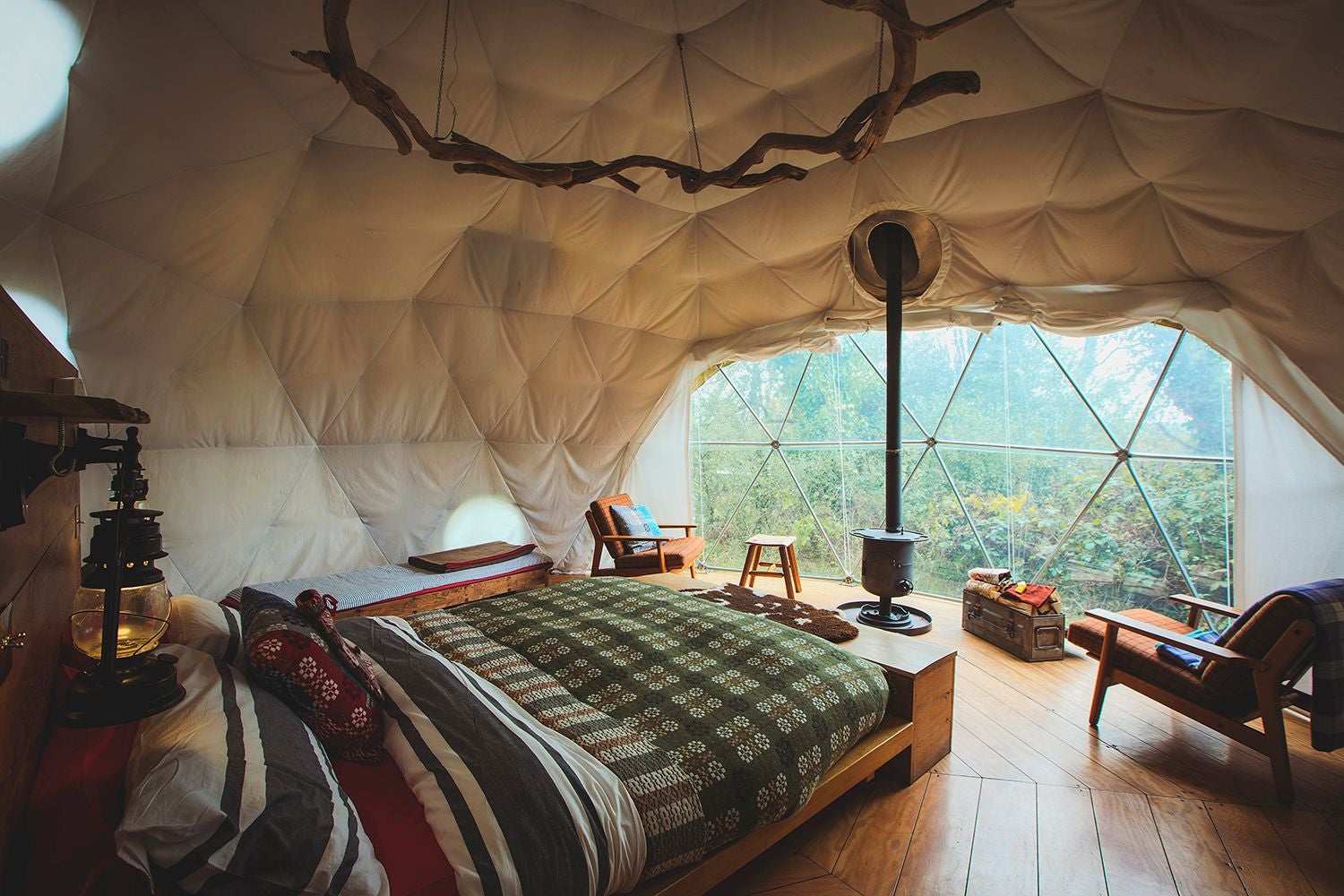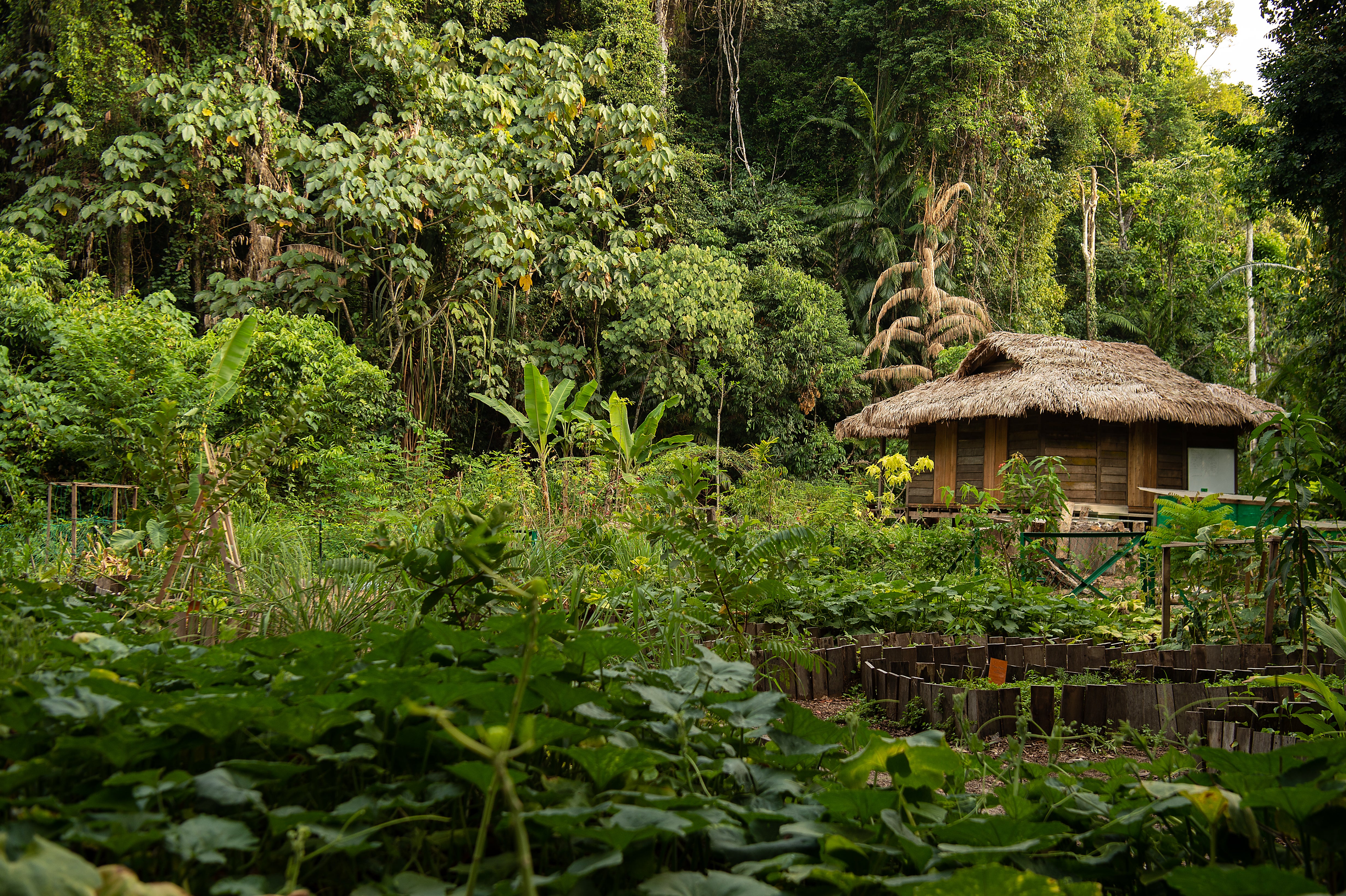How to know if a hotel’s eco credentials are up to scratch
It can be hard to discern where legit claims end and greenwashing begins. Juliet Kinsman shares her tips for booking bona fide eco digs

Picture the scene. “Darling, I’m booking us an eco hotel.” Partner, by now picturing wood-chip toilets, no charging points, itchy hemp sheets and scrambled tofu: “Really? Must we? What does that even mean?”
But if you’re someone who lusts after hotel stays that let you revel in creature comforts better than you have at home, rest assured we’ve come a long way since the term “eco stay” may have sparked shivers.
The good news: guilt-free getaways are growing in number – and they needn’t involve camping (although Fforest in Wales could make a convert of anyone). The bad news: since it’s oh-so-fashionable to seem sustainable, it’s challenging to discern who’s the real deal and is walking their talk. If it’s not made of bamboo and upcycled flip-flops, hosted by vegan XR-activists turned yogis off-grid in a pristine nature reserve, how to truly ascertain whether it’s eco at all?
What does ‘eco’ stand for?
Let’s look at the origins of the word ‘ecology’ for starters. ‘Oekologie’ came into being after 19th-century German zookeeper, Ernst Haeckel, was keen to coin a term for the study of life. Inspired by the Greek word, Oikos meaning ‘home’, it’s come to be that ‘ecologically friendly’ refers to goods or services that purport not to be harmful to our home – Planet Earth.
What should ‘eco-friendly’ mean?
An eco hotel qualifies as that by actively doing good for people and planet (not just doffing its cap to the green movement to look good or to make an opportunistic property-developer-owner richer). The folks building the accommodation and those hosting it need to demonstrate a head and heart for positive impact and passion for minimising their footprint every step of the way. It’s about transparency and setting targets.
Define the five “Rs”
The tenets of sustainability – refuse, reduce, reuse, recycle, rot – are front of mind for a true eco hotel. As well as reducing energy use and emissions, also kept low is the amount of stuff in circulation – from unnecessary amenities to more-is-more buffets. Green means eschewing all things single-use and disposable — ‘no plastic straws’ is a limp boast these days. Bankside, Inhabit and the Pilgrm are among London’s next-gen hotels helping guests to skip bottled water thanks to filtered-water stations. Recycling is a given – some Alila hotels even encourage you to fill a bag with anything you don’t need to take home as charitable donations. Guests might be rewarded for reusing sheets and towels with tokens for cocktails, while old bedlinen is upcycled into beach bags. As for “rot” – this can be as simple as composting all kitchen scraps.
Efficient utility use
An eco hotel by definition works closely with nature, minimising a reliance on fossil fuels and keeping the consumption of natural resources in check. Tell-tale signs? They talk in technical terms about pioneering new renewable energy sources, or loudly and proudly boast about low-flow showers and innovatively harvested rainwater for toilets or landscaping. Big up paradise resort The Brando in French Polynesia for coming up with its own seawater-cooled air-con invention (SWAC), which is powered by the sun’s rays and coconut oil. Solar-panelled Svart in Norway is designed to be energy-positive, thanks to operations requiring 85 per cent less power than the usual set-up, even giving back to the grid.

Urban hotels can qualify
City slickers can be tuned into nature’s way of being. Biophilic design is a bonus, when nature is simulated or emulated through architecture and interior design. Roof gardens, such as at Ham Yard Hotel, enhance biodiversity and provide habitats for birds and insects. Greenery in the living walls inside 1 Hotels in New York and Miami, and the sky gardens at Park Royal at Pickering in Singapore, oxygenate the air, process carbon and counter pollution.
Intelligent insulation
Gramercy Townhouse by Sudha in New York was the first passive house in Manhattan. The centuries-old Passivhaus building principles hailing from Germany denote a bioclimatic architecture which means indoor temperatures don’t rely on air-conditioning or central heating. Clever design and an investment in high-performance glazing mean it’s naturally climate-controlled. And at Gramercy Townhouse the air feels clean as can be – a breath of fresh air, right in the heart of New York City.
They love to talk rubbish
Provenance is paramount: from buying local to keep cash in the community, to measuring the emissions of every link in their supply chain
Globally, the greatest garbage generator is food waste. In nature, there’s no such thing as waste. Think of closed-loop systems as explained in school-day science lessons: all organic matter is part of a virtuous circle. Permaculture is the perfect circular-economy case study for showing how goods can be repurposed, as opposed to a traditional capitalist approach to procurement which follows a buy, use, throw model. Hotels with a better back-of-house way of being have beady eyes on all that heads to landfill. They go the extra mile with recycling – even getting creative with arts and crafts activities such as in the The Lab at the Datai Langkawi in Malaysia. They might invest in anaerobic digesters to convert solid waste into liquids. Some turn compost into biogas or biofertiliser. Mimicking nature’s principles, from worm farms in old baths that produce rich soil to naturally recycling everything, more and more hotels are adopting this MO. Soneva’s “waste-to-wealth” ethos in the Maldives has proven especially valuable in the archipelago nation. Their Eco-Centro Complex alchemises metals, bottles and coconut husks into items of economic value, such as building materials, a system they’re piloting as the Namoona Baa Initiative to be rolled out with the government as a wider waste-management system.
Measurable impact
“Aspirations and commitments aren’t enough – we need to measure real impact.” That’s how Costas Christ, one of sustainability’s most respected arbiters, puts it, and he’s set up Beyond Green with Preferred Hotel Group to create a standard of leadership to exemplify what’s possible. The portfolio of 24 founder hotels includes unlikely heroes such as an InterContinental outpost in Bora Bora, French Polynesia and Ashford Castle in Ireland’s County Mayo. Headquartered in Australia, Intrepid Travel is the world’s largest carbon-neutral travel company; it set a benchmark in the sector by signing up to the Science-Based Targets Initiative (SBTi). This means they measure and reduce their emissions across operations, from the trips they arrange to ensuring offices run on renewables. And, as well as active decarbonisation, it offsets emissions by 125 per cent.
Certifications help…
But considering hospitality is awash with hundreds of accreditations, how to know which seals of approval really mean something? Official seals from trusted third-parties such as EarthCheck indicate a hotel has conformed to exceptional standards of practice – but not all kitemarks are created equal. BREEAM (Building Research Establishment Environmental Assessment Method) and LEED (Leadership in Energy and Environmental Design) denote the construction met green building principles, but it doesn’t speak to how ethical management is as employers or if they care about leaving money in the local economy. B Corp certification means a business has legally considered the impact of every decision on its team, customers, suppliers, community, and the environment.

Show, don’t tell
The upping of the eco ante has also turned on the tap to greenwashing – so it’s important there’s meaning in every message from hotels. Declaring on their website “we have a conscience” doesn’t cut it unless they qualify their creds. A token-gesture herb garden or a little turtle-tagging isn’t enough. Provenance is paramount: from buying local to keep cash in the community, to measuring the emissions of every link in their supply chain.
Saving the environment is about more than preserving it
A rise in greenhouse gases in our atmosphere is pushing up the mercury – but the social and economic forces contributing to the climate emergency need to be addressed as well as environmental issues. Weighing up the greatest challenges to our world today always deserves a lively conversation around context and trade-offs. Conservation and rewilding, and burning fewer fossil fuels are priorities, but so is striving for equality, promoting indigenous rights, and the education of girls in remote areas to tackle population control. One aspect of being eco is that hotels have a responsibility to improve accessibility for people of all physical and mental abilities or to employ disadvantaged staff where they might otherwise be marginalised. Mitigating emissions on a personal or property level is essential, but the health of far-flung ecosystems also relies on longer-term socio-economic benefits from our travels. It’s nuanced. Which makes that community-school-funding eco lodge in the Moroccan or Nepalese mountains with a diesel generator and bottled water harder to categorise according to the typical eco criteria, right? Are they still one of the good guys? Go with your gut.
Juliet Kinsman is author of The Green Edit: Travel, Easy Tips for the Eco-Friendly Traveller (Ebury) and shares shares sustainable travel tips through her platform Bouteco
Join our commenting forum
Join thought-provoking conversations, follow other Independent readers and see their replies
Comments

Bookmark popover
Removed from bookmarks